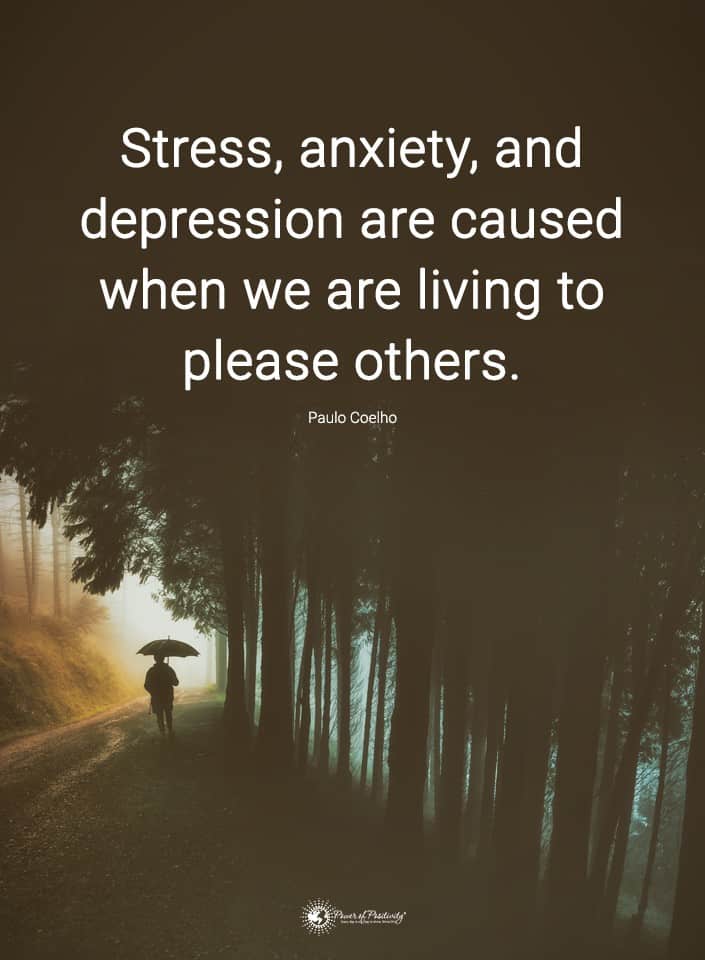When anxiety strikes, the world starts to feel small and heavy. We get weighed down by our problems and can’t move to fix anything. People suffer from these feelings every single day. While a permanent solution may require a lot of hard work and personal reflection, here are 20 quotes to help you beat the symptoms of an anxiety attack.
20 Quotes to Remember When You Feel the First Symptoms of an Anxiety Attack

1. “If you want to conquer the anxiety of life, live in the moment, live in the breath.” ~ Amit Ray
When anxiety strikes, it’s important to stay in the moment. Many experts suggest focusing in on the things around you to help get out of your own anxious thoughts. Count how many red things are in the room or count your breaths. This will bring you back to reality.
2. “Man is not worried by real problems so much as by his imagined anxieties about real problems” ~ Epictetus
We all have problems. These problems do greatly affect our lives. Most of the anxiety does not come from these problems but instead our worst fears about these problems. It’s best to focus on the actual problem itself.
3. “Our anxiety does not empty tomorrow of its sorrows, but only empties today of its strengths.” ~ C. H. Spurgeon
We are not at our strongest when we are in the middle of an anxiety attack. The anxiety made us weak for the current moment, but it didn’t fix anything we were worried about. If you want to stay strong, you need to gain control over your anxiety.
4. “Anxiety’s like a rocking chair. It gives you something to do, but it doesn’t get you very far.” ~ Jodi Picoult
Anxiety is a way to fill the mind. Unfortunately, the thoughts aren’t the most productive. You tend to think in circles and end up in the same spot you started.
5. “Anxiety was born in the very same moment as mankind. And since we will never be able to master it, we will have to learn to live with it—just as we have learned to live with storms.” ~ Paulo Coelho
Anxiety is part of life. Anxiety is worse for some people than others, but we all experience it. To get through life, we need to learn how to adjust to the anxiety we experience. Just like we can’t get rid of thunderstorms, we can’t get rid of it.
6. “In an era of stress and anxiety, when the present seems unstable and the future unlikely, the natural response is to retreat and withdraw from reality, taking recourse either in fantasies of the future or in modified visions of a half-imagined past.” ~ Alan Moore
Anxiety gives us a perception of the past and future that does not truly match reality. We escape to this altered reality but when we come back, the reality is just as we left it. We would do better to stick to what’s happening.
7. “Some people feel guilty about their anxieties and regard them as a defect of faith. I don’t agree at all. They are afflictions, not sins. Like all afflictions, they are, if we can so take them, our share in the Passion of Christ” ~ C.S. Lewis
People can feel bad about their anxiety, especially when it causes them to miss certain events or hurt people. It’s important to remember that you should not have to apologize for your anxiety. It will likely only cause greater anxiety. Instead, try to fix it from within yourself.
8. “The little cares that fretted me,
I lost them yesterday
Among the fields above the sea,
Among the winds at play.”
~ Unknown
This childlike poem reminds us exactly how we should deal with our nerves. We should just let them go. When we let them go, they will fly away with the wind. We will feel lighter and just generally better about ourselves. The only problem is that letting go of the symptoms of an oncoming anxiety attack is easier said than done.
9. “Fear and anxiety many times indicates that we are moving in a positive direction, out of the safe confines of our comfort zone, and in the direction of our true purpose.” ~ Charles F. Glassman
Fear isn’t always bad. It could be a sign that we are doing the right thing. Sometimes the right thing can be scary.
10. “You don’t have to control your thoughts. You just have to stop letting them control you.” ~ Dan Millman
Many people try to stop anxiety from happening at all. Instead, the goal should be to not let the anxiety make an impact. Allow it to flow through you and escape without affecting you. When you have this control over your emotions, you will be able to handle things with a clear mind.

11. “How does one kill fear, I wonder? How do you shoot a spectre through the heart, slash off its spectral head, take it by its spectral throat?” ~ Joseph Conrad
In this cheeky quote, Joseph Conrad pokes fun at the idea of trying to destroy our anxiety. It’s not a physical thing that we can stab with a sword. However, there may be some useful tools at our disposal.
12. “Free time is death to the anxious, and thank god I don’t have any of it right now.” ~ Jon Stewart
If you tend to get anxiety, one great solution is to keep yourself super busy. When you are busy, you don’t have time to worry. Keep yourself busy with work and family.
13. “You wouldn’t worry so much about what others think of you if you realized how seldom they do.” ~ Eleanor Roosevelt
Much of our anxiety comes from a bit of narcissism. This is especially true when we are worried about what other people think of us. The truth of the matter is that most people probably don’t care nearly as much as we think they do.
14. “Overthinking is not a disease; it is due to the underuse of your creative power.” ~ Amit Ray
Another great way to tackle anxiety is to focus that energy into something creative. During a panic attack, it’s best to turn to music, art, or writing. Letting out the intense feelings of the panic attack can make it much more manageable.
15. “So much of anxiety was anxiety about having anxiety.” ~ Maureen Johnson
When you are prone to anxiety attacks, you may understand this one. You can get anxiety about getting social anxiety before you even go out. Wait for the anxiety actually to come before you freak yourself out even more.
16. “But you can’t hide from the day forever. The day happens anyway, you know.” ~ Megan Atwood
Anxiety can cause people to hide in the house all day. While they hide inside all day, the world still tuns. The person hiding because of their anxiety may miss out on the beautiful things that happened that day. It’s best to get out there and life live.
17. “Sometimes it is useful to fear something too much, for it makes the real thing quite bearable.” ~ Sarah Dunant
Have you ever been so worried about a test or the dentist that you almost cried but when you got there, it wasn’t that bad? That’s one of the few benefits of anxiety. When you do finally face the real problem, it’s probably far less serious than you anticipated.
18. “Action wanes anxiety because when you act, you improve the circumstance you were anxious about which then improves the thought you’re responding to.” ~ Daniel V Chappell
Probably the absolute best solution to anxiety is to take action to fix the thing you are anxious about. When you take action, you gain control over the situation. It makes everything much more manageable.
 19. “Nothing can bring you peace but yourself.” ~ Ralph Waldo Emerson
19. “Nothing can bring you peace but yourself.” ~ Ralph Waldo Emerson
People search for solutions from panic attacks in several places. They will try medication, different foods, and even drugs. The best solution is internal. You need to find peace within yourself to make a long term difference.
20. “You are not alone…please know that hope can fly in on the most unexpected of wings.” ~ Tracy Shawn
One of the biggest misconceptions about anxiety is that no one else will ever understand what you’re going through. The truth of the matter is that many people suffer the same way every single day. Instead of sticking to yourself, you should seek support from other people. You may be surprised to find how many people want to help you live a happier life.
 Final Thoughts: Know the Symptoms of Anxiety and Panic Attacks, Then Remember These Quotes
Final Thoughts: Know the Symptoms of Anxiety and Panic Attacks, Then Remember These Quotes
You may suffer from the symptoms of anxiety and panic attacks for the rest of your life. However, it’s important to learn how to manage them to the best of your ability. Use these quotes to help give you the strength to fight to get the help you need.













